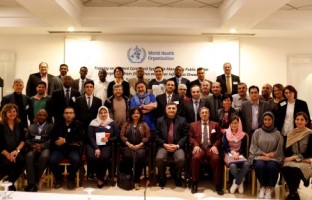 Tunis, 19 December 2016 – WHO's Regional Office for the Eastern Mediterranean is hosting a 4-day workshop in Tunis, Tunisia, on Incident Command Systems (ICS) to strengthen the capacity of Member States to respond to health emergencies, such as an outbreak of Zika virus or other infectious disease.
Tunis, 19 December 2016 – WHO's Regional Office for the Eastern Mediterranean is hosting a 4-day workshop in Tunis, Tunisia, on Incident Command Systems (ICS) to strengthen the capacity of Member States to respond to health emergencies, such as an outbreak of Zika virus or other infectious disease.
Although cases of Zika virus disease have not yet been reported in the Region, the risk is considerable, given that the Aedes mosquito exists in several countries in the Region where cases of dengue, chikungunya and/or yellow fever have been reported in the past.
The Regional Preparedness and Readiness Plan for Zika Virus Infection was developed in February 2016 after the announcement of Zika virus as a public health emergency of international concern due to clusters of microcephaly cases and other neurological disorders reported in Brazil, following a similar cluster in French Polynesia in 2014. The declaration called for a set of recommended actions to strengthen surveillance and response to Zika virus infection.
One of the gaps identified for preparedness and readiness for Zika virus infections in the Region was the absence of an ICS to facilitate coordination during a public health emergency. An ICS identifies components critical to an effective response in an emergency, such as clear lines of communication, chain of command, planning, accountability and multi-agency coordination.
The ICS workshop is intended to improve participants' knowledge of establishing and running an ICS, as well as establishing links between ICS and emergency response operations and a country's emergency operations centres.
The workshop was inaugurated by Dr Syed Jaffar Hussain, WHO Country Representative for Libya and Tunisia. "The incident command system will help Member States in effectively pinning down the Zika virus infection, as well as serve as a mechanism to respond to any outbreak of epidemic or pandemic nature," he said to the 30 participants attending from ministries of health of regional countries.
The training, which includes three days of classroom sessions and one table-top simulation, is being run in partnership with the Asian Disaster Preparedness Center, Johns Hopkins University and Centers for Disease Control and Prevention (CDC), who have extensive experience in running such courses in Asia and the Americas.








